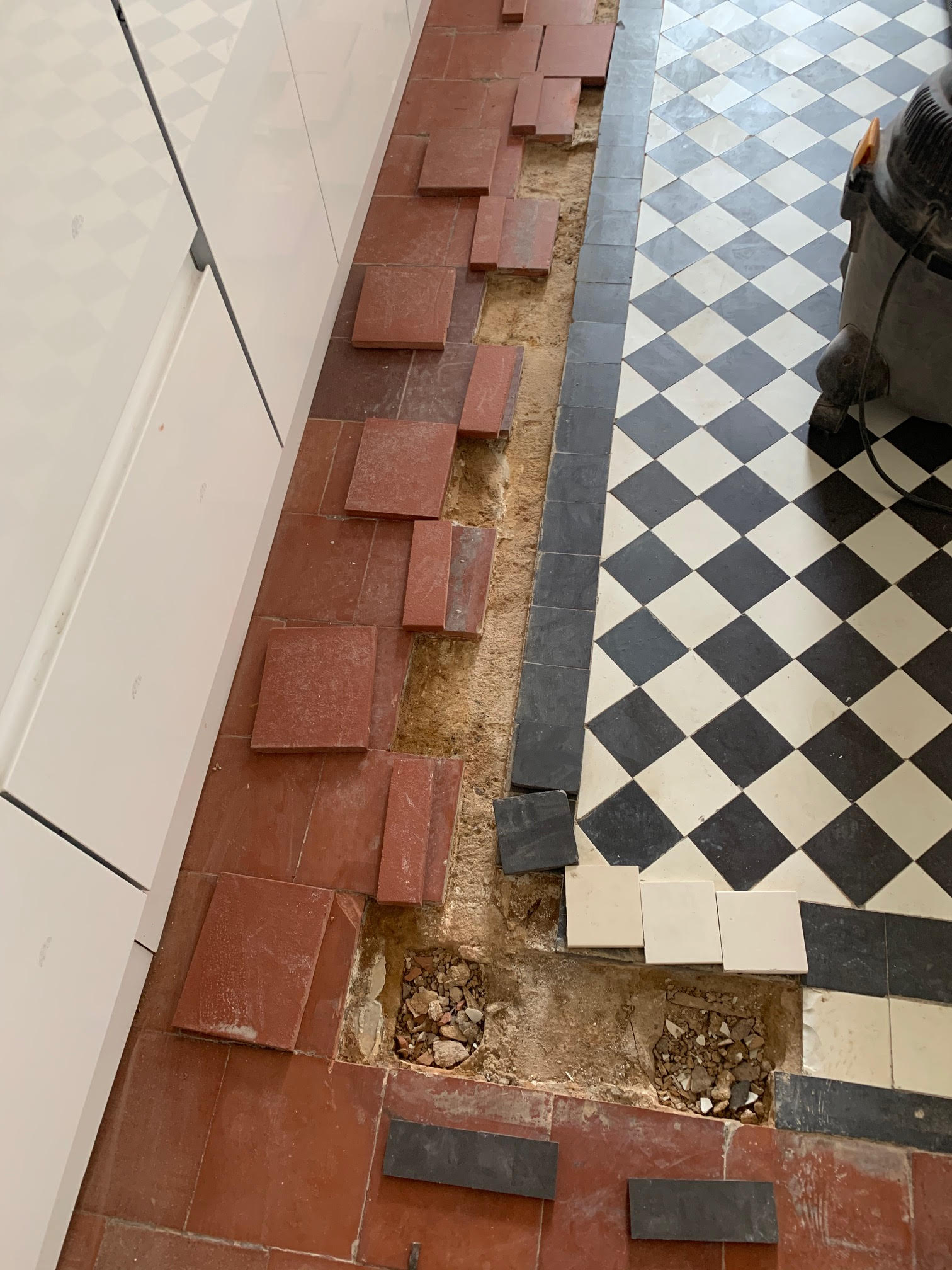This customer in Rugby had some major internal work done on their property to increase the size of the kitchen. Effectively they had combined two areas together, but this had left gaps in the floor tiling where the walls had once been. Although I had discussed the floor in detail over the phone, I visited the property so I could survey the floor and give the owners an accurate quote for the remedial work.
 |
 |
If you look closely at the image above, you will see where the under-stair cupboards and support posts have been removed. The changes meant sections of untiled floor were now visible and needed new matching quarry tiles added to fill the gaps including large deep holes where the support post had once been.

After inspecting the floor, I prepared a comprehensive quote that included cutting and fixing replacement Quarry tiles and giving the whole floor a deep clean and seal so the new would blend in with the old. My quote was much a much cheaper option compared with ripping out the whole floor and replacing with new. Also, I was confident I could find a good match for the Quarry tiles among my collection of reclaimed tiles I had available. Being a Tile Doctor I focus a lot on restoration and have accumulated quite a collection of old tiles as you never know when they might come in handy.
After weighing up the options the customer confirmed they would like to go ahead with the work, so we agreed a date for my return.
Fitting Matching Quarry Tiles to a Kitchen Floor
The first job was to hand cut matching quarry tiles to fit, clean out the holes in the floor and prepare a new level base within with cement. I had to wait for the new base to harden so I wasn’t able to fit the tiles until the next day however I was able to use a quick setting tile adhesive for that so I was able to grout them in later that day once the adhesive had gone off.
 |
 |
As well as the Quarry tiles there was a section beneath a door threshold that needed fixing with matching replacements. I left the adhesive and grout to fully harden overnight leaving behind yellow cones to mark the affected tiles so the owner would know where not to walk.
Deep Cleaning a Quarry Tiled Kitchen Floor
On day three with the tiling work completed I was able to move onto deep cleaning the floor. For this I used Tile Doctor Oxy-Gel which I prefer when working in smaller areas as being in gel form it is much easier to control. The gel is applied with a little water to help dilute it and then left to soak in for ten minutes. The floor is then scrubbed with a black scrubbing pad fitted to a buffing machine and the soil extracted with a wet vacuum.
Next, I treated the tiles to an acid wash using an application of Tile Doctor Acid Gel, again this is in gel form and is left on the tiles for ten minutes before being scrubbed in with a pad. This product further cleans the tiles by removing grout smears, hazing and other mineral deposits. Afterwards the floor was rinsed with water and the resultant slurry extracted with a wet vacuum to remove any trace of cleaning products.

Before leaving for the day, the floor was inspected, and any stubborn marks spot cleaned until I was happy the floor was as clean as it possibly could be. I was pleased to see that the newly laid tiles were already blending in nicely.
Sealing a Quarry Tiled Kitchen Floor
It’s not a good idea to apply a sealer to damp tiles as the result can be inconsistent so I agreed with my customer to come back five days later to seal them. On my return I checked the moisture levels with a damp meter to be certain the Quarry tiles were dry before applying an initial application of Tile Doctor Stone Oil. Stone Oil seeps into the pores of the Quarry tiles adding protection and restoring colour and texture.
Once dry I followed up with a couple of coats of Tile Doctor Colour Grow which like the Stone Oil impregnates deep into the pores of the tile to prevent dirt becoming ingrained there. This sealer also enhances colour and combined with the Stone Oil will provide long lasting durable protection to the floor. Kitchens generally tend to be high traffic areas with people coming and going all the time so it’s important the tiles are protected.

Once complete the floor looked great, as promised the new tiles blended in well with the original, and most importantly my client over the moon as the renovated floor had added the finishing touch to the newly fitted kitchen.
 |
 |
Source: Floor Tile Cleaning and Renovation Service in Warwickshire